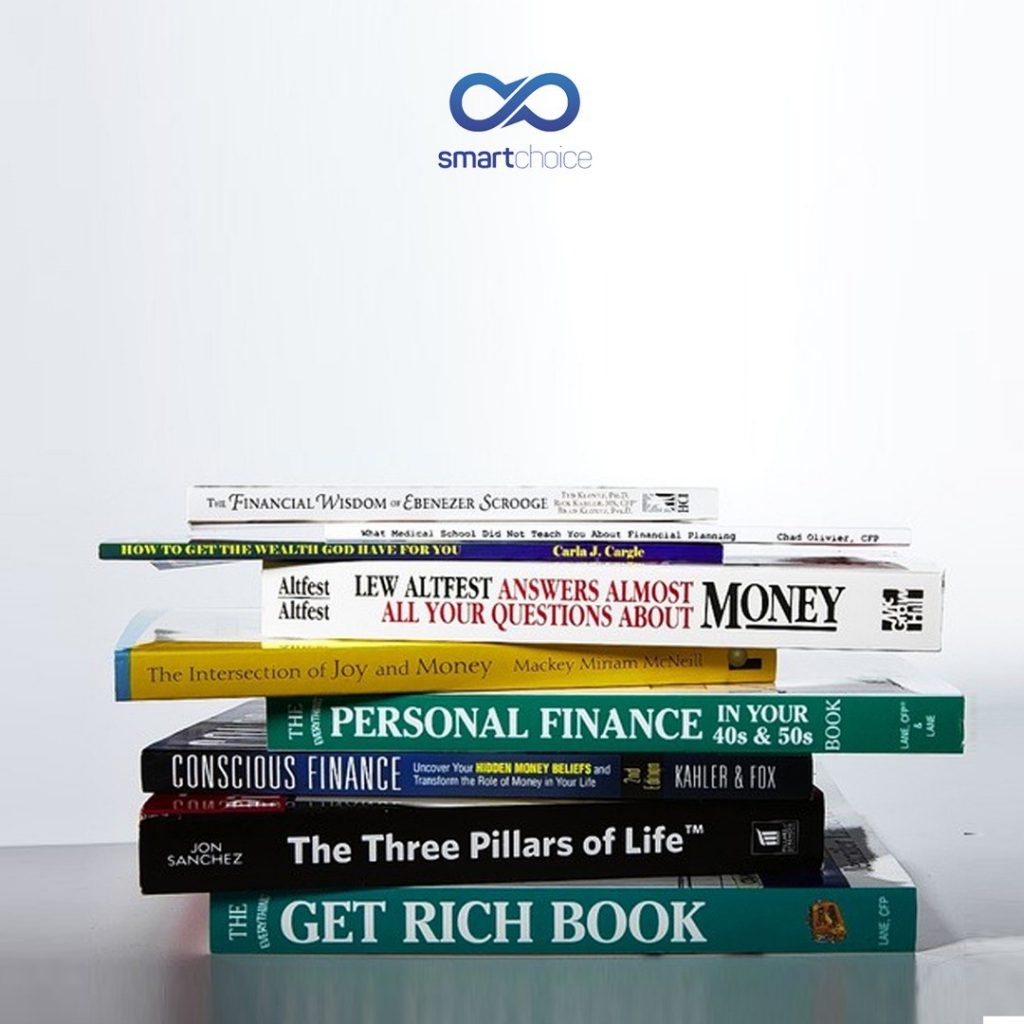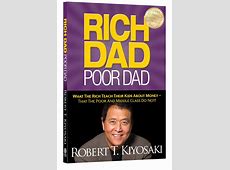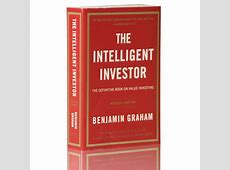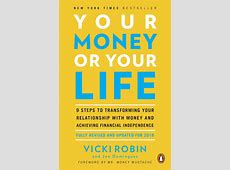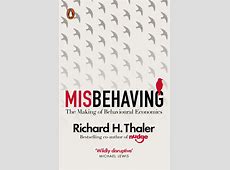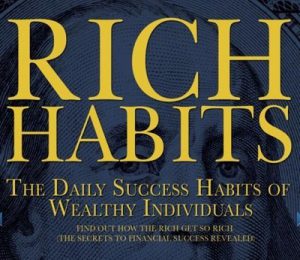The financial books act as a bible for a person new to managing his/her finances, it can be an event that someone has recently started working or has started a family and wants to save and spend mindfully so these are the few recommended financial books to handle your expenses properly and to even invest them with the right approach and insight.
Rich Dad, Poor Dad
Rich Dad, Poor Dad is one of the best-selling financial books in history, selling over 35 million copies since its publication in 1997.
The book doesn’t teach the tactics of getting rich as much as it does the principles: the mindset and high-level strategies that distinguish the wealthy from the hapless.
Unfortunately, as many critics have commented, much of Rich Dad, Poor Dad is flawed. It’s not clear exactly how and when to apply the principles and less discerning readers can follow the advice and get into trouble. Here are some caveats to set the advice in context.
Rich Dad, Poor Dad doesn’t engage on tactical details that would help people apply the decisions. Kiyosaki says these are out of the scope of the book, and maybe details would alienate the popular reader, but it’s a poor excuse. Examples of useful questions to cover:
When does it make sense to rent vs buying a house? What will end up being a better financial decision in the long run?
How do you assess the risk and return of an investment? How do you compare different investment opportunities to each other?
What do the data show how higher education affects one’s income?
What are the lessons you learn from a rich dad poor dad:
Lesson 1: Rich don’t work for Money
This refers to the never-ending goals rich people set until they reach the threshold point, where they don’t have to think about money. Kiyosaki here has talked about the passive income that generates cash flow even if you are not working. General people work hard for high wages but, as soon as they stop working, cash flow ends there. But if you carefully invest in your assets where the cash flow is recurring, you don’t have to worry about money.
Lesson 2: Why teach financial literacy
In the second lesson, Kiyosaki has explained the concept of Assets and Liabilities in his way. According to him, assets should be something that can create a source of income and liabilities are something that has got a net value associated with it. According to him, to be rich, one needs to own multiple assets for generating unlimited cash flow. He has also laid the stress on generating cash flow first before thinking about spending it on luxuries.
Lesson 3: Mind your own business
Kiyosaki has explained about investment ideas here. He has encouraged readers to spend their money in profitable investment rather than spending too many bucks in materialistic expenses. He has explained here how to maintain your financial budget, be intelligent with the expenditures, how to utilize assets like mutual funds, stocks, bonds, real estates, intellectual properties, etc to generate money, how to correctly invest and utilize your paycheck money and everything related to investment strategies.
The book provides many valuable financial lessons but these 3 are the key ones. It is one of the best choices of the individuals who are interested in smart investment strategies and aim to live a luxurious life.
Who would I recommend the Rich Dad Poor Dad summary to?
The 9-year old who just got her first allowance, the 42-year-old who’s worried about her job being secure and anyone who doesn’t know what the definition of an asset is
The intelligent investor
The intelligent investor by Benjamin Graham is such a great book that even Warren Buffett himself wrote a preface for it. Warren said that he first read the first edition of the book in 1950. He was only nineteen years old at the time. He thought then, and still is now, that The Intelligent Investor is by far the best book about investing.
Warren said that to invest successfully over a lifetime does not require a stratospheric IQ, unusual business insights, or inside information. We only need a sound intellectual framework for making decisions and the ability to keep emotions from corroding that framework. The Intelligent Investor book precisely and prescribes the proper framework. But Warren said that it is still us that must supply the emotional discipline.
Warren specifically pointed out chapter 8 (Mr Market) and 20 (Margin of Safety) as the main two chapters that contain invaluable advice. He says in the book that if we pay special attention to those 2 chapters, we will not get a poor result from our investments.
But as to whether we achieve outstanding results, it would depend on the effort and intellect we apply to our investments, as well as the amplitudes of stock market folly that prevail during our investing career.
The sillier the behaviour of the market, the greater the opportunity for a businesslike investor. If we follow Graham, we will profit from folly rather than participate in it.
The Intelligent Investor puts special emphasis on teaching:
1. Risk management through asset allocation and diversification.
2. Maximizing probabilities through valuations analysis and margin of safety.
3. A disciplined approach that will prevent consequential errors to a portfolio.
Your Money or Your Life
our Money or Your Life is a bit unusual in terms of personal finance books that you’ll typically find at your local bookstore. For starters, the book has very little concrete information about increasing your wealth. In a section that typically is loaded with books about becoming a millionaire, this is an unusual approach.
So what does Your Money or Your Life offer instead? Rather than focusing on being rich, the book instead looks deeply at finding the central values in one’s life and realigning your life and money to follow these values. The idea here is that most people’s money problems are connected to a lack of fundamental direction in their life: they work just to earn money, not because it’s what they love doing.
The book uses several rather unorthodox methods for exposing this truth in your life. Much of the book is spent defining values and placing them in real financial perspective, going so far as to often conclude that you should quit your job. In terms of a get rich quick scheme, this is anathema, but it is also quite enlightening.
The book’s real purpose is to reframe your relationship with money, not to reframe your management with money. If this seems kind of “New Age-y,” that’s because it is. The book makes no qualms about stating that for many people, working a full workweek is not the best way to live life and that one should seek the best way to live their own life, not live the life others expect or demand.
The book has lots of anecdotes – but it has a lot of detail, too. This is a fairly long book as personal finance books go, but it provides a lot of food for thought even if you don’t buy into the overall plan. So let’s get started and find out where this yellow brick road leads us.
Walking Through Your Money or Your Life the plans starts with a series of psychological sledgehammers that can change your perspectives on money. These steps are relatively unorthodox, but often bring to light the actual value of money in your life compared to the value you put on money.
Do I receive fulfilment and value compared to the life energy spent on this?
Is this use of my life energy in line with my values and goals?
How would this expenditure change if I didn’t have to work?
The surprising result is that most of the expenditures of time and money in your life are simply enablers in an attempt to keep making money. They don’t reflect what else is important to you.
The book is divided into multiple chapters each chapter focusing on an integral part of your life, for instance, the seventh chapter focusses on to critically re-evaluate your job and says that if your job doesn’t match up with your values, quit it. The book does encourage you to use your current job as “training wheels” as you get ready to leap, but your goal should be to spend your time in a way that’s both personally and professionally fulfilling.
The eight-chapter of the book encourages you to find the crossover point or that moment in which your investment income can cover your living expenses. Once you’ve switched your priorities around and your living expenses are less than your income, you should start investing that money to maximize your investment income and continue living frugally. Once you’ve reached a point where your income from your investments can cover your living expenses, you’re free to do whatever you want with your life.
Chapter 9 indicates the final steps of your money management where you’ve reached the point where your investments are still growing even after you remove your living expenses. At this point, you can begin to splurge but do it carefully.
The book encourages you to split your money into three parts: capital (the amount that you have invested), cushion (six months of living expenses in a savings account), and cache (overflow). The cushion should stay roughly steady, being filled by the income from your capital at the same rate you spend it, and your cache is the overflow from that. Your cache is what you can spend on your dreams like opening up a charity organization, making a trust fund for your children, spending on your wishes basically at this point the world is your oyster.
After reading the above push points about the book, if you still confused to Buy or Don’t Buy the book?
Right at the start of the prologue of Your Money or Your Life, the authors have a list of questions for you to ask yourself:
– Do you have enough money?
– Are you spending enough time with your family and friends?
– Do you come home from your job full of life?
– Do you have time to participate in things you believe are worthwhile?
– If you were laid off from your job, would you see it as an opportunity?
– Are you satisfied with the contribution you have made to the world?
– Are you at peace with money?
– Does your job reflect your values?
– Do you have enough savings to see you through six months of normal living expenses?
– Is your life whole? Do all the pieces – your job, your expenditures, your relationships, your values – fit together?
If you read through this list and hear a lot of “no” answers in your head, buy this book. Rather than being a guide on what you can do with your money to make more money, this book instead focuses on what you can do with your money to make your life make more sense, and it does a very good job with this. I would especially recommend this book to anyone who has a guilt-filled relationship with their money and want to fix it.
It’s important to note that this book is not in any way a guide to investing your money. If your goals are leading you to seek strong investment advice or methods of maximizing your net worth, don’t buy this book. There are plenty of books out there for you; this is not one of them.
Misbehaving
The economist Richard H. Thaler has written a sly and somewhat subversive history of his profession. Although billed as an account of the major developments in behavioral economics over the last half-century, the book is part memoir, part attack on a breed of economist who dominated the academy – particularly, the Chicago School that dominated economic theory at the University of Chicago for the much of the latter part of the 20th century.
Professor Thaler is generally happy to name names when detailing the intellectual deficiencies and petty rivalries of his vocation. An academic tell-all would typically not hold much interest or even likely find a publisher. Two aspects of “Misbehaving: The Making of Behavioral Economics,” (W.W. Norton & Company) however, make it both engrossing and highly relevant. First, economists have increasingly become the go-to experts on every manner of business and public policy issue facing society.
Second, rather than being a disgruntled former employee or otherwise easily marginalized whistle-blower, Mr Thaler recently took the reins as president of the American Economic Association (and still teaches at Chicago’s graduate business program, the Booth School of Business).
The economics profession that Mr Thaler entered in the early 1970s was deeply invested in proving that it was more than mere social science. But economic outcomes are the result of human decision-making. To achieve the same mathematical precision of hard sciences, economists made a radically simplifying assumption that people are “optimizers” whose behaviour is as predictable as the speed of physical body falling through space.
Early in his career, Professor Thaler created a list of observed behaviours that were inconsistent with the predictions of established orthodoxy. These found names like “the endowment effect,” which leads individuals to systematically value things they already own much more than the identical item in someone else’s hands. “Misbehaving” charts Mr Thaler’s journey to document these anomalies in the face of economists’ increasingly desperate, and sometimes comical, efforts to deny their existence or relevance.
Professor Thaler’s entertaining book provides an important reminder of both the challenges and opportunities that come from working across the sometimes artificial boundaries between academic disciplines.
Indeed, interdisciplinary collaborations often yield least-common-denominator pabulum. But as with the work of academics like Professor Thaler questions even the most deeply held institutional convictions, it has led to genuine advances in how we view the world. The “misbehaving” of Professor Thaler’s title aims to refer to how human actions are inconsistent with rationalist economic theory.
It refers to his professional misbehaviour in rejecting the prevalent worldview of academic economists at the time. Although not without any serious risk to any aspiring academics, his book and his career have inspired more miscreants across a wide range of intellectual specialities.
Rich Habits The Daily Success Habits of Wealthy Individuals
Tom Corley gives you a Rich Habit Promises for you to apply in your life to live a prosperous life.
• I WILL form good daily habits and follow these daily habits each day.
• I WILL set goals for each day, for each month, for each year and the long-term; I WILL focus on my goals each day.
• I WILL engage in self-improvement each day.
• I WILL devote part of each day in caring for my health.
• I WILL devote part of each day to forming lifelong relationships.
• I WILL live each day in a state of moderation.
• I WILL accomplish my daily tasks each day; I will adopt a “DO IT NOW” mindset.
• I WILL engage in rich thinking each day.
• I WILL save ten per cent of my gross income every paycheck.
• I WILL control my thoughts and emotions each day.
Like I said pretty basically such as devoting time to caring for your health, Anyway, there’s some value there. However, as the first book I’ve ever read on finance, yes it would probably be a great book because It can help you formulate goals, saving 10%, forming a habit etc.
these few books can save you money that you spend without understanding the proper concept of saving, spending and investment concepts as these are the basic ones to be understood to live a prosperous and happy life.
Some these books don’t offer you a complete ad complex ways to save your money but they are insightful and help you get the grip on few imminent matters at hand.
One simple way to save money is to compare before buying always, so your decision is based on market research and comprehensive information, Smartchoice.pk-your one-stop financial market is one such model for all your financial decision making. Search-Compare & Save.

